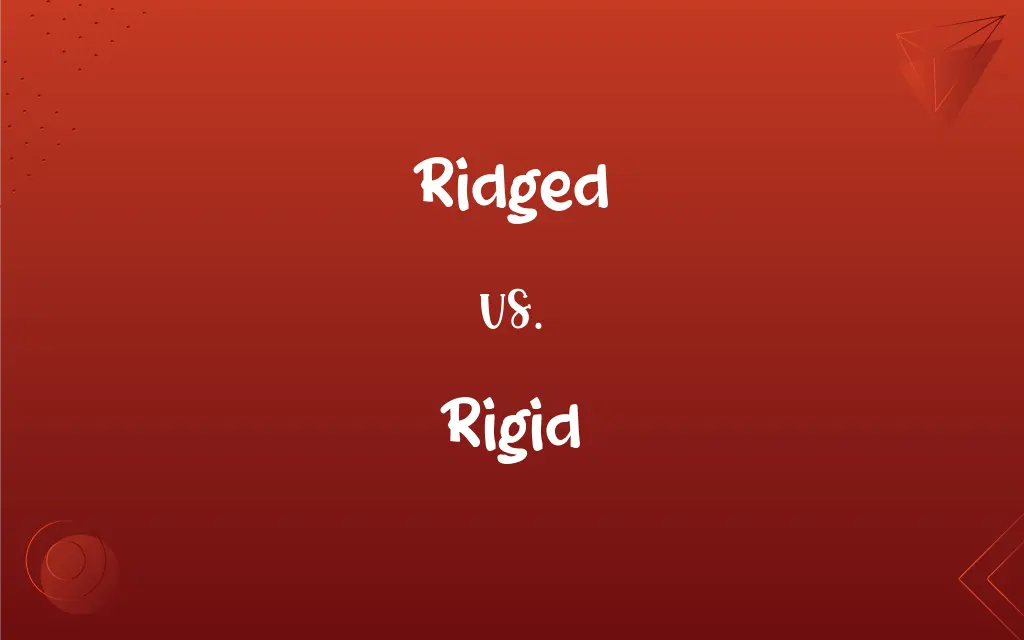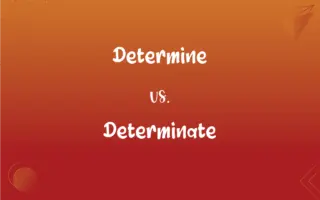Ridged vs. Rigid: What's the Difference?
Edited by Aimie Carlson || By Janet White || Updated on October 5, 2023
Ridged vs. Rigid: "Ridged" describes something having raised lines or edges; "Rigid" means stiff or inflexible.

Key Differences
"Ridged" and "Rigid" are two distinct English words with different meanings, often mistakenly used interchangeably. Ridged refers to an object or surface that possesses a series of raised lines or edges. On the other hand, Rigid is used to describe something that is unyielding, stiff, or inflexible.
A ridged surface can be both visually and tangibly identified by its pattern of elevations and depressions. For instance, a potato chip that has a wavy pattern is described as ridged. Meanwhile, the word "Rigid" might refer to objects that are hard to bend, twist, or change in form.
While "Ridged" emphasizes the physical texture or topography of an object, "Rigid" places importance on the resistance an object offers to alteration in shape or mindset. Think of a ridged metal sheet; the metal is ridged due to its texture and rigid due to its unyielding nature.
Items like ridged nails or ridged patterns on clothing highlight aesthetic or functional attributes. Conversely, rigid principles or a rigid frame of mind shed light on the unbending nature, whether in materials or thoughts.
Conclusively, "Ridged" primarily addresses physical characteristics pertaining to surface texture, while "Rigid" addresses a quality of inflexibility or strictness, both in tangible objects and intangible concepts.
ADVERTISEMENT
Comparison Chart
Definition
Having raised lines or edges
Stiff or unyielding
Physicality
Often refers to tangible textures
Can be physical or intangible
Flexibility
Doesn't denote flexibility
Specifically denotes inflexibility
Common Use Cases
Texture, patterns
Structure, mindset, principles
Synonym
Grooved
Inflexible
ADVERTISEMENT
Ridged and Rigid Definitions
Ridged
Having a series of raised lines or edges.
The ridged pattern on the sole provides better grip.*
Rigid
Strict or severe in nature.
His rigid guidelines left no room for creativity.*
Ridged
Characterized by elevated strips.
The ridged surface prevented slipping.*
Rigid
Immovable or fixed in place.
The structure was rigid and could withstand heavy winds.*
Ridged
Marked with or forming ridges.
He noticed the ridged texture of the pottery.*
Rigid
Resistant to change.
The old system was rigid and outdated.*
Ridged
Containing a sequence of narrow raised bands.
The ridged fabric added depth to the dress design.*
Rigid
Uncompromising or inflexible.
She had a rigid stance on the issue and wouldn't budge.*
Ridged
A long narrow upper section or crest
The ridge of a wave.
Rigid
Lacking flexibility; stiff.
The rigid metal did not bend under pressure.*
Ridged
A long, narrow, elevated section of the earth's surface, such as a chain of hills or mountains or the divide between adjacent valleys.
Rigid
Not flexible or pliant; stiff
A rigid material.
Ridged
A long mountain range on the ocean floor.
Rigid
Not moving or flexing
Rigid muscles.
Ridged
A narrow, elongated zone of relatively high atmospheric pressure. Also called wedge.
Rigid
Not changing or adjusting to different conditions or problems
A rigid thinker.
A rigid hierarchy.
Ridged
A long, narrow, or crested part of the body
The ridge of the nose.
Rigid
Scrupulously or severely maintained or performed; rigorous or harsh
Rigid discipline.
Ridged
The horizontal line formed by the juncture of two sloping planes, especially the line formed by the surfaces at the top of a roof.
Rigid
Being an airship with a external frame made of rigid parts.
Ridged
A narrow, raised strip, as in cloth or on plowed ground.
Rigid
Stiff, rather than flexible.
Ridged
To mark with, form into, or provide with a ridge or ridges.
Rigid
Fixed, rather than moving.
Ridged
To form a ridge or ridges.
Rigid
Rigorous and unbending.
Ridged
Having ridges.
Rigid
Uncompromising.
Ridged
Simple past tense and past participle of ridge
Rigid
(aviation) An airship whose shape is maintained solely by an internal and/or external rigid structural framework, without using internal gas pressure to stiffen the vehicle (the lifting gas is at atmospheric pressure); typically also equipped with multiple redundant gasbags, unlike other types of airship.
The rigid could reach the greatest sizes and speeds of any airship, but was expensive to build and bulky to store. Rigids fell out of favor after the R101 and Hindenburg disasters made the type seem unsafe to the travelling public.
Ridged
Having a ridge or shaped like a ridge or the keel of a ship;
A carinate sepal
Rigid
A bicycle with no suspension system.
Ridged
Having or shaped like a carina or keel
Rigid
Firm; stiff; unyielding; not pliant; not flexible.
Upright beams innumerableOf rigid spears.
Ridged
Grooved or furrowed.
The ridged design added an elegant touch to the jewelry.*
Rigid
Hence, not lax or indulgent; severe; inflexible; strict; as, a rigid father or master; rigid discipline; rigid criticism; a rigid sentence.
The more rigid order of principles in religion and government.
Rigid
Incapable of or resistant to bending;
A rigid strip of metal
A table made of rigid plastic
A palace guardsman stiff as a poker
Rigid
Incapable of compromise or flexibility
Rigid
Incapable of adapting or changing to meet circumstances;
A rigid disciplinarian
An inflexible law
An unbending will to dominate
Rigid
Fixed and unmoving;
With eyes set in a fixed glassy stare
His bearded face already has a set hollow look
A face rigid with pain
Rigid
Designating an airship or dirigible having a form maintained by a stiff unyielding frame or structure
FAQs
Are "Ridged" and "Rigid" interchangeable?
No, "Ridged" describes texture while "Rigid" indicates stiffness.
Can something be both "Ridged" and "Rigid"?
Yes, like a ridged metal sheet that's also unyielding.
Is "Ridged" always about physical texture?
Typically, yes. It describes surfaces with raised lines or edges.
Are ridged chips crunchier than non-ridged ones?
Texture doesn't determine crunchiness, but ridged chips may feel thicker or sturdier.
Can "Rigid" describe a person's mindset?
Yes, it can mean uncompromising or inflexible in thinking.
Is "Rigid" synonymous with "Hard"?
Not always, "Rigid" means resistant to bending, while "Hard" means firm to touch.
Why would an object be designed to be "Rigid"?
Rigid designs offer stability, strength, or resistance to change.
Does "Rigid" always imply something negative?
No, it simply means stiff or inflexible, which can be positive in some contexts.
Can fabrics be "Ridged"?
Yes, if they have a textured, raised pattern or weave.
Can "Rigid" refer to rules or structures?
Yes, indicating they're strict or hard to alter.
Do "Ridged" surfaces always serve a functional purpose?
Not always, they can be purely decorative.
Why might a tool have a "Ridged" grip?
To provide better hold and prevent slipping.
Are all "Rigid" materials heavy?
No, rigidity refers to stiffness, not weight.
Can "Rigid" describe a schedule?
Yes, meaning it's strict with little to no flexibility.
Does "Ridged" imply roughness?
Not necessarily, it describes texture but not the coarseness.
Is a "Rigid" posture good?
It can be negative if implying unnatural stiffness, but can also mean upright and strong.
In what contexts is being "Rigid" advantageous?
In situations requiring stability, consistency, or resistance to external forces.
How does a "Ridged" surface feel?
It feels textured with a pattern of raised lines or edges.
Can landscapes be "Ridged"?
Yes, describing areas with series of mountain ridges or raised terrains.
Is a "Ridged" design always visible?
Typically, as it refers to a surface's tangible texture.
About Author
Written by
Janet WhiteJanet White has been an esteemed writer and blogger for Difference Wiki. Holding a Master's degree in Science and Medical Journalism from the prestigious Boston University, she has consistently demonstrated her expertise and passion for her field. When she's not immersed in her work, Janet relishes her time exercising, delving into a good book, and cherishing moments with friends and family.
Edited by
Aimie CarlsonAimie Carlson, holding a master's degree in English literature, is a fervent English language enthusiast. She lends her writing talents to Difference Wiki, a prominent website that specializes in comparisons, offering readers insightful analyses that both captivate and inform.































































